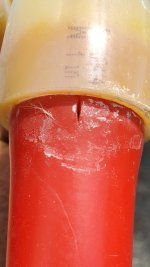TimeBandit
Well-Known Member
- Joined
- Sep 18, 2019
- Messages
- 2,396
- Reaction score
- 5,458
I have no idea when our house was piped in copper, built in 1969, we moved here in 2000.
They used 3/4 bendable pipe from near the inlet pressure regulator to I have no idea where, it
disappears into the drywall over the water heater.
This is the second pinhole leak I've fixed, the last time was about 10 years ago. Both leaks luckily
were in the garage where I could see/fix them, same pipe about 18" apart.
Both times I drilled out the pinhole with a 1/16" drill, sanded the area, heated it up, fluxed it and
filled the hole with solder. The hole is on the bottom part of the pipe so I'm not sure how much
solder got "up" into the hole, but it stopped the leak.
The first fix is still holding, it would be a tough section to replace, fingers crossed.
They used 3/4 bendable pipe from near the inlet pressure regulator to I have no idea where, it
disappears into the drywall over the water heater.
This is the second pinhole leak I've fixed, the last time was about 10 years ago. Both leaks luckily
were in the garage where I could see/fix them, same pipe about 18" apart.
Both times I drilled out the pinhole with a 1/16" drill, sanded the area, heated it up, fluxed it and
filled the hole with solder. The hole is on the bottom part of the pipe so I'm not sure how much
solder got "up" into the hole, but it stopped the leak.
The first fix is still holding, it would be a tough section to replace, fingers crossed.




